
Friday, April 29, 2005
The Fusion is Ford's Future
This can be blamed on the management team of the 1990's. Back then, Ford was awash in cash from selling trucks and SUVs, gas was cheap, and people apparently didn't think cars were going to be that important in the future. The strategy for much of the domestic industry seemed to be to pump development dollars into trucks and SUVs, where the profit margins were, and use cars as loss-leaders, like CDs at Walmart. (Man, did they learn their lesson)
The Fusion and its brothers are critical for Ford in North America. If the Fusion doesn't sell well, Ford is as good as dead. Market share will continue to decline, and the business will become unsustainable, if all other trends continue.
Thursday, April 28, 2005
The H1-B Bomber
The truth is, Bill Gates wants more cheap engineers. There are lots of experienced, older engineers out there, who are unemployed or underemployed. They are unemployed because they are more expensive, rather than out of date--the fundamentals of most engineering disciplines have not changed in many years, only many of the tools and tricks.
If engineers are in such tight demand, you would expect that their salaries would be skyrocketing. But they aren't (mine isn't). If engineers were so hard to get, you would think that companies would work hard to keep them, instead of laying them off when things get tight.
If there was a shortage of engineers, the market would adjust, and sweeten the deal, to attract more students to engineering. But college students are not beating down the doors to get into engineering programs, because they know how engineers are treated. The kids are pursuing law, medicine, finance--if you are going to be worked like a dog, you might as well get paid for it.
A good, compact article on this subject is here.
Pet Safe Coolant
This is a smart solution. For once, I agree with California's government.
But, no dogs, cats, or kids would be able to drink any type coolant if the stuff was stored properly, unless their car is leaking. People need to keep all of their chemicals sealed and out of reach, or they invite tragedy. And get the leaks fixed.
Wednesday, April 27, 2005
California Ammunition Serial Number Stupidity
What a dumb idea. As usually is the case with gun control laws, this law will hurt the ammunition manufacturers and legal users, and have no impact on criminals.
- Vast stockpiles of un-numbered ammunition exist, and will take years to be expended.
- Unless all the other states follow suit, anyone would be able to obtain unmarked ammo by going to a different state.
- Even if all US made ammunition is marked, unmarked ammunition will be smuggled in on the black market, just as cocaine, heroin, and illegal weapons are.
- Serial numbers on guns have not enabled the police to trace weapons from manufacture to criminal reliably, so why would ammunition serial numbers?
Tuesday, April 26, 2005
Charity From Toyota?
Reading about it later, I see that there is wisdom in what Hiroshi Okuda said. It is an example of Japanese long term, careful thinking. From the Seattle Post:
"I'm concerned about the current situation surrounding GM. Although a trade conflict, like ones (that) happened in the past, may be avoided, there may be some impact (on Japan's car industry) because the car industry is symbolic in the U.S. economy," Okuda was quoted as saying by the Japanese daily Asahi Shimbun.
There are several reasons why Toyota would want to moderate its domination of the American auto market. GM and Ford sre both huge companies, and the failure of one would be devastating to the US economy. Toyota would lose business, because many fewer people would be able to buy new cars, as the economic shock wave rippled outward.
As mentioned in the quote, Toyota is wary of a "buy American" backlash, that would also hurt their sales. Toyota wants to avoid protective US government intervention, in an effort to save Detroit.
The failure of GM and Ford would also be devastating to the supply base, which either supplies Toyota or provides competition to Toyotas suppliers, keeping prices in check.
Toyota wants to win, but it has a timetable for its goals. Toyota is patient.
Want A Good Cheap Car? Try a Taurus.
I told her to check out a late model used Taurus or Chevy Malibu instead.
For the money, a 1 or 2 year old off-lease Taurus is probably the best deal going in the midsize car market. They depreciate so badly that you can get a nicely equipped, low mileage car for a veary reasonable price, $11,000-ish. Especially in the Metro Detroit area, where Tauruses are commonly used by rental fleets and Ford employee leases.
Probably the best source for a used car are the rental car companies, because they maintain their cars regularly, which is not always the case with private owners.
A quick comparison chart:
| Model | 2005 Kia Spectra EX, new | 2003 Chevy Malibu, 30,000 miles | 2003 Ford Taurus, 30,000 miles |
| Powertrain |
|
|
|
| Safety |
|
|
|
| Comfort |
|
|
|
| Warranty | 5 year (60,000mi) 10 year powertrain | 1 year (12000mi) | 1 year (12000mi) |
| Price (Invoice or Private Party KBB) | $15,800 | $10,000 | $11,200 |
The Taurus is safer than the Spectra, is larger,can be had with a more powerful engine (though the Taurus is heavier), and is availible with more "high end" options such as leather seats and in-dash CD changer. The Spectra definitely has a better warranty, but for about $1,500 you can buy an extended warranty for the Taurus. (These are not usually worth it). The Malibu does not have safety specs that are as good, but is also a very good deal. Another good option in this same vein is the Buick Century.
The lady who asked me for my advice wound up buying a used Mercury Sable, with leather, fake wood, shiny wheels, the works, and is quite happy with it.
Monday, April 25, 2005
Why Americans Prefer Cars Over Public Transportation
But the point is not necessarily which system of transport is more environmentally friendly, or even more cost effective. We are not necessarily economic creatures. Public transportation sucks because we have to be sitting flesh to flesh with strangers, who don't bathe, or have bizarre body ornaments, or are listening to Eminem so loudly on their headphones you can here every expletive two seats over.
Americans love cars, and are cool to public transportation because we love the freedom to go where we want, when we want, and with as few passengers as we want.
What we need is a compromise between individuality and efficiency. Fast public transportation around dense urban areas, and wide highways running in between them. Places to park your car on the outskirts if you are going to stay all day, and convenient (though expensive) parking if you just need to visit for an hour.
And (in Michigan) fix the effing potholes!
Invest in GM or F?
If you do invest in GM or F, remember that in the case of a bankrupcy, the bondholders are payed before the stockholders.
If you are a Ford or GM employee, make sure you have less than 10% of your 401(k) invested in company stock. Otherwise, you could be Enron'd.
(I own stock, and paper, at the moment. Kinda like being in Vegas... without the free booze.)
Friday, April 22, 2005
More Zephyr Details
I have heard that the Zephyr will get the new 3.5L Duratec 35 engine, after it is introduced with the 3.0L. The HP numbers on the 3.5L aren't out, but they should be about 250HP, based on displacement. The Zephyr will also get AWD. Ford's strategy, apparently was to get the car out soon, and improve it later. Still no plans for a manual transmission, from what I have heard.
The larger engine and AWD will really help the car, I think. I hope that people aren't turned off by the weak first model.
Sign Me Up
A former Costco Wholesale worker who was fired for refusing to remove her eyebrow ring has appealed to the U.S. Supreme Court. She has accused Costco of religious discrimination. She claims membership in the Church of Body Modification. And, while you're at it, Your Honor, leave me alone, too. I'm a member of the Church of Exceeding The Speed Limit.Heh. Sign me up, Reverend Sherlock!
Thursday, April 21, 2005
Chrysler Considering Chinese Takeout
This is a bad direction for American manufacturing jobs, and it may be a very dangerous decision for a manufacturer to make. Not because of quality, or consumer backlash--people are willing, apparently, to buy goods from anywhere, even at the expense of domestic industries.
China has been increasingly aggressive in its attitude towards Taiwan, which the US is obligated to defend. If China starts a war with Taiwan, in an attempt to conquer its "rogue province", the effects on any business producing goods in China for export to the US would be devastating.
Wednesday, April 20, 2005
Enough, Already
The 300 is a nice car. But Chrysler is always one hit away from going under.
Seatbelts on School Buses
A major benefit to seatbelts: kids that are belted in will be less likely to engage in fighting or other disruptive behavior, since their mobility will be limited.
There are a few arguments that I have heard against seatbelts in buses that make any real sense. The first is that kids that are belted in will have a harder time escaping the bus, should it be on fire or under water. But, as Carpundit points out, these types of accidents are extremely rare.
I have read that when seatbelts are installed in buses, kids won't use them. But this is an enforcement issue. If kids are taught from an early age to buckle up, and bus drivers do a check to make sure that kids are wearing belts, the usage rate will improve. Eventually, it will be a habit.
Another argument is cost. Buses are not cheap to begin with, coming in at around $50,000 for a 72 passenger bus, and they are in service for around 15 years. If seatbelts cost $25 per seat, that is $1800, or a whopping 3% increase in cost. Amortized over 15 years, (without interest), we are looking at all of $120/year/bus for seatbelts.
A more subtle cost argument is that the money would be more effectively spent on student and driver training than seatbelts, that there would be better value in accident avoidance. The problem here is that there may not be enough statistical data out there to draw a solid conclusion. On the other hand, we know from first principles that seatbelts save lives.
There is an in depth article on this subject here.
Tuesday, April 19, 2005
ELF Goes to Prison [Politics]
From the Associate Press:
A Caltech graduate student convicted of helping to firebomb scores of sport utility vehicles was sentenced to more than eight years in federal prison and ordered to pay $3.5 million in restitution.The brat is lucky that no one was killed due to his firebombs--he could have found himself on death row.
A federal judge Monday rejected William Jensen Cottrell's plea for leniency."There's no way I'd ever be involved in anything like this again," Cottrell said. "I won't ever even jaywalk again."
Cottrell, 24, was convicted in November of conspiracy to commit arson and seven counts of arson for an August 2003 vandalism spree that damaged and destroyed about 125 SUVs at dealerships and homes in the San Gabriel Valley east of Los Angeles.
...
Monday, April 18, 2005
Honda: If You Hose Out your Element, You're Hosed
Sunday, April 17, 2005
Plug-in Hybrids, Do They Make Sense?
A plug-in hybrid is an HEV which has a 110VAC connection, which can recharge the battery pack, while the vehicle is parked. With a fully charged battery pack, the PIHEV will use even less fuel than a normal hybrid, on short trips. On long trips, the battery pack will be drained and the vehicle will have to rely as much on its IC engine as a regular HEV. The CalCars Prius+ prototype was estimated at 120MPG for a 70 mile mixed city/highway trip.
The advantages to a PIHEV are that it uses less fuel for short trips, and that the electricity that is used to charge the batteries is cheaper than generating electricity on board from gasoline.
There are some disadvantages, however, which CalCars does not emphasize on their web site.
A plug-in hybrid will be even more expensive than a normal HEV, because of the larger battery packs that CalCars proposes for a PIHEV, and the added electronics to do the 110V charging. The EPRI published a report (lots of great information about HEVs) which estimated that a PIHEV with a 20 mile electric-only range would have about a $3,000 price premium over a conventional HEV. A PIHEV will also be heavier.
Another disadvantage is that a PIHEV is a step backwards, in a way, from CalCars stated goal of reducing emissions. Our grid electricity is generated mostly from burning hydrocarbon fuels--in 2000, 52% of US electricity was generated from burning Coal, 16% from natural gas, and 3% was from petroleum. Another 20% was generated from nuclear power plants (my favorite source). I don't know if the grid-to-wheels route is more efficient, in a CO2 sense.
I don't see the economics working out for PIHEVs. If a PIHEV costs $3,000 more than a comparable HEV, and an urban driver is getting an additional 70MPG, he is saving $429 a year on fuel (171 gallons @ $2.50, 12,000 mi/year), and it will take him exactly 7 years to recoup the additional cost--not counting the cost of the grid electricity. Pure electric operation costs, according to CalCars, $0.01/mi, based on off-peak discounted California electricity rates of $0.05/kWhr. If our driver drives 50% of his miles on grid charge, then he is going to be paying $60/year back for electricity, which means he will now need 8.1 years to pay back his additional investment.
I read somewhere once that the average American keeps a car for about 8 years.
Saturday, April 16, 2005
Buy Regular, Save Money (Octane)
The main difference between "premium" and "regular" gasoline is the octane rating. The octane rating number is a measure of how resistant to premature detonation (knock) the fuel is. Some premium fuels may have additional detergents and other additives. For a more detailed article on gasoline chemistry, see Wikipedia.
Knock occurs when the air/fuel mixture in the cylinder detonates due to heat and pressure, before the spark ignites the mixture, or ahead of the flame front after a spark ignition. The result is faster than desired combustion, and higher than normal cylinder pressure, which can damage the engine. Knock sounds from the drivers seat like a metallic rattling or pinging.
High performance engines typically run higher compression ratios, or forced induction, since more air and fuel per L means more HP/L. The higher the compression ratio, the higher peak pressure and temperature the air/fuel mixture will reach during the compression stroke, and the more knock resistant the mixture must be.
Modern cars have an accelerometer (or two) mounted on the engine block, to detect knock. This accelerometer measures high frequency (5-20kHz) vibrations of the engine block. On a V8 engine, you may have one knock sensor on each engine bank. As your car runs, the engine controller (ECU) constantly monitors the signal from the knock sensor, and uses it to adjust the timing of the ignition spark. Under normal conditions, the ECU will advance the spark timing, moving it later in the compression cycle, until it senses the very early stages of knock ("borderline spark"), minus a safety margin. This maximizes the power output.
If the ECU senses knock, it attempts to prevent it by retarding the timing of spark, moving the start of ignition earlier in the compression cycle. This reduces the peak pressure in the cylinder, reducing the likelihood of knock. It also reduces the power output of the engine, because less pressure means less torque.
This is what will happen if you run regular gas instead of premium. You will pay for this with slightly worse fuel economy, as you might loose 5% of your power, but you may not even notice the difference. Labeled fuel economy is calculated from controlled drive cycles in a lab, and few of us drive consistently enough to measure small differences in fuel economy.
* To be safe, I would not run regular gas in a turbocharged or supercharged engine. It does not take much knock at high load and high RPMs to ruin your day. If you do hear knock, slow down your engine right away (tip out), drive gently, and go back to premium gas.
Friday, April 15, 2005
My New Avatar...
My new avatar, in the style of SouthPark. This is not a bad charicature of me, except that I don't walk around with a beer all of the time.

If you want to make your own, there is a gadget here.
Thursday, April 14, 2005
NHTSA: Standardize the Interface
At the SAE Congress, Dr. Joseph Kanianthra presented data (Detroit News article here) that showed the relative death rates of car passengers, when struck by a light truck or SUV.
For example, in 2001, there were 1,163 deaths when cars were struck in the side by other cars. There were 2,008 deaths when cars were struck by light trucks, NHTSA's latest research shows. (nearly double)
NHTSA and the OEMs need to collaborate, and come up with a set of interface standards between light trucks and cars. Then, those standards need to be made mandatory, and NHTSA would require tests designed to these standards. These would be similar to the new IIHS side impact test, which simulates the high bumper of an SUV hitting a vehicle in the side.
I am not a structural engineer, so I don't know exactly how the new standards would look like. The crash structures of light trucks may need to be lowered to better interface with cars, and the crash structures of cars would be raised.
For example, I might require that light trucks have a subframe in the front and rear, which would contact most car bumpers in the event of a front or rear crash, preventing over-run. This sub-frame could perhaps be removable, for the 3 Hummer H2 owners out there who actually want to take their behemoths off-roading.
I would also require cars to have a strong high mounted side impact beam, and side curtain airbags, to protect the passengers if a light truck hits them from the side.
Wednesday, April 13, 2005
FrankJ on Taxes
Heh. More here.FUN FACTS ABOUT TAXES
Read More »
* Taxes strike violently without notice at the exact same time each year.
* A lot of people get excited when they get some of the money back that the government had been taking from their paychecks all year; this is a bit like if there was a robber who kept breaking in and stealing your stuff each week, and you got all excited when, after a year, he brings back your T.V.
* There's a place on the tax form where you can declare all your illegal earnings. I think that's a trick.
* It is illegal to kill an I.R.S. agent and constitutes a huge fine - but the fine is tax deductible.
* The I.R.S. headquarters is a cursed place built on an ancient Indian burial ground. It's filled with spirits, but they barely ever make any disturbances since most are trying to hide from the death tax.
* In a fight between Aquaman and taxes, the I.R.S. would seize Aquaman's kingdom in Atlantis and put it up for auction. It would then be bought by his arch nemesis - BLACK MANTA!!!
* The government takes money out of each paycheck because, if once a year everyone actually had to write a check for their income tax, there would be a huge riot. I want all my money each paycheck and a cool riot!
* Taxes attack without mercy or remorse. They cannot be stopped by bullets or fire.
* Taxes are so unstoppable and attack so swiftly, they cannot even be dodged by a ninja!
* The best way to avoid taxes is being a hobo... though certain high-trafficked bloggers may try to murder you.
* If taxes are after you, don't try praying to God for help because He's currently dodging omnipotence tax.* When Jesus was asked about taxes, He said, "Render unto Caesar what is Caesar's." Now, he'd probably just avoid Caesar altogether through some non-profit organization.
* The tax code is the largest, most complex set of written material in the history of the universe. At its current rate of growth, it will block out the sun by 2067 and plunge us into eternal winter. On the other hand, there will be a few new deductions for mortgage interest.
* Democrats like taxes, but claim they only want to tax the rich (that's how income tax started). If you see a Democrat, lock him in a crate and throw it in the sea so he won't raise your taxes.
Tuesday, April 12, 2005
SAE Congress 2005: Photoblog

Cobo Hall, surrounded by orange

At 9:00 on the 12th, Bob Lutz gave a talk titled "The Lost Art of Fun". I was there, but I didn't take notes. There is a good Detroit News article here. (Unfortunately, my photo didn't come out, there was enough light for my digital point-and-shoot camera to focus.)
The thrust of Bob Lutz' talk was that automotive engineering should be fun, and that he products we build should be fun as well. Paraphrasing:
"Coming to work should be fun. As fun as dropping a crate motor into your project car in your garage".Lutz also criticized the American development of engineers, saying that in Europe engineers always start as draftsmen. I don't disagree, although there is not much point in training a software engineer to draft engine blocks.
"U.S. auto engineers are at a distinct disadvantage from Asian engineers because of the way they're trained," Lutz said at the Society of Automotive Engineers World Congress at Cobo Center. "We are actually training our engineers to be managers, while the rest of the world trains them to be doers. We are deliberately avoiding hands-on engineers and ... we need to change that."When asked, during the Q&A, if Lutz thought that NHTSA's desire to enforce speed limits was not the best use of its time, Lutz delicately pointed out that he has to be careful not to get in trouble with his answer (we know what he wanted to say).
Lutz also said that GM was committed to building affordable fun-to-drive vehicles, and pointed out the Cobalt SS, Saturn Sky (he accidentally said "vue", I think), and Pontiac Solstice as examples.
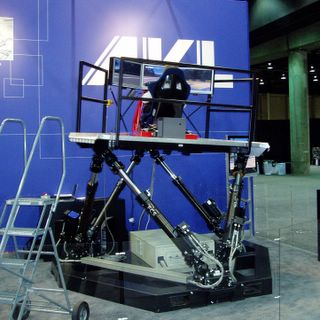
AVL had an amazing driving simulator set up, using an FCS Hexatech hydraulic platform. I signed up for a time slot early, and got a chance to do a lap. Think of a 3-screen version of Grand Tourismo, with force feedback and three dimensional acceleration. Wow.

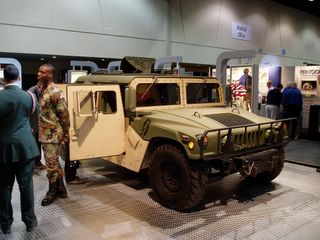
Up-armored HMMV at the Tardec display. This had ~3" thick laminated glass windows, and ~1" thick armor plating all around.

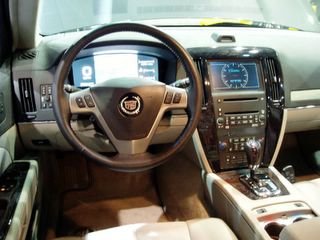
Interior of the Cadillac STS SAE 100, with the mapping IP display.

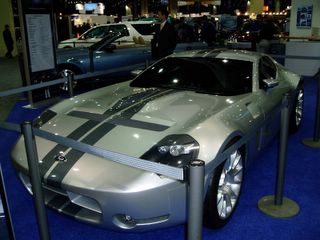
Ford Shelby GR1 Concept, at the Ford pavillion

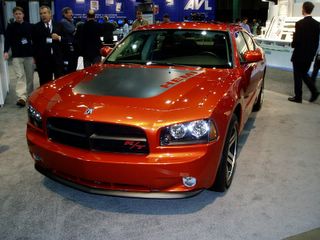
Dodge Charger RT Concept, at the Chrysler pavillion

Monday, April 11, 2005
Lutz Funny
Q: Stability control?
A: Very important.
Q: Airbags?
A: Very important.
Q: The more the merrier?
A: I think there's a logical conclusion. I told our guys at some point we are going to design one huge inflatable thing that fills the whole [car] ... so where if you hit a lamp post you find yourself pressed against the seat as if you were lying under the belly of a beached whale.
Heh.
Death Spiral?
I can't help but think, at present, that GM and Ford are in a death spiral. Unless something fundamental changes, in 5 years there won't be both a GM and Ford as we know them. An all-out collapse is unlikely, when you considering the economic damage that would ensue. What I see happening is a decline in market share, and erosion of financials, until GM is forced to re-organize under Chapter 11, and Ford is merged with a cash-rich competitor, such as Honda.
The legacy costs of the Big 2 have to be addressed. Without GM and Ford growing market share, the pension plans and healthcare costs are, like Social Security, not sustainable. And what do you think the chances of market share increase really are, given the ascendancy of Toyota, Honda, and Nissan? With Hyundai growing, and Bricklin getting ready to lob Chinese econo-boxes across the Pacific ocean?
The effects on the economy of SE Michigan will devastating, like a nuclear weapon.
(What do you think? Am I being too gloomy?)
Lincoln Zephyr: DOA?
Unfortunately, I have to agree. I don't see what the Zephyr will do to advance Lincoln's image. It really can't compete with the other "entry level" luxury cars on performance, although I think the looks are sharp.
Fundamentally, Ford won't be able to convince people that the Zephyr is not more than a prettied up Fusion. The Zephyr will ship with a powertrain identical to its less luxurious sisters, the 210HP 3.0L-4V "Duratech" V6. This is not a bad motor, but it is not sufficient for a car that is supposed to compete with other entry-level luxury cars in the $30,000 range. And the only transmission choice is a FWD automatic; no manual transmission or AWD has been announced.
For about the same price, someone could choose a BMW 3 series, with a 255HP I-6, RWD. Or an Acura TL, with a 270HP V6. Or an Audi A4 with a 200HP I-4 turbo, and all-wheel drive. Or a Cadillac CTS. Or a Saab...
All of Zephyr's competitors have world class interiors, great sound systems, sharp styling. Many of them can be had with a manual transsmission, or RWD, or AWD. Pretty much all of them will outrun the Zephyr. And, I am afraid, pretty much all of them will outsell the Zephyr.
Friday, April 08, 2005
GM Strikes Back
In response to a series of articles about the auto maker, General Motors Corp. has pulled all of its advertising from Tribune Co.'s Los Angeles Times for the foreseeable future, GM said yesterday.
At the heart of the issue are some factual errors and misrepresentations in the editorial coverage, said Ryndee Carney, a GM spokeswoman. It's not just one story. It's a series of things that have happened over time, and we've made our objections known to the paper, and so we'd like to keep our discussions between us and the paper private. Ms. Carney added, As a general policy, we don't do this. It's very, very rare.
...
One media buyer said the amount would likely be in excess of $10 million annually. The auto maker spent about $2.8 billion on media time and space for advertising in 2004, according to TNS Media Intelligence.
Good.
The LA Times has a right to publish anything it wants--but GM is not obligated to pay for word of it.
Wednesday, April 06, 2005
Democrats Like Foreign Cars [Politics]
...buyers of American cars tend to be Republican - except, for some reason, those who buy Pontiacs, who tend to be Democrats. Foreign-brand compact cars are usually bought by Democrats - but not Mini Coopers, which are bought by almost
equal numbers of Democrats and Republicans.
More about this study is mentioned at The Car Connection (3/4 down the page).
A few examples, gleaned from these articles:
Vehicle makes which are more likely to be driven by Republicans:
Land Rover
*Jeep
*Ford Trucks, SUVs
*Lincoln
*Buick
*Mercury
*Cadillac
*Chrysler
*Hummer
Vehicle makes more likely to be driven by Democrats:
Subaru
Hyundai
Volvo
Saab
*Pontiac
*Saturn
VW
Honda
* = UAW built.
What is quickly apparent from this list is that Democrats are not, apparently, making much of an effort to buy UAW made vehicles. And, lets not forget that the Democrats joined with the Republicans to support NAFTA. If I was a UAW man, I would not be pleased.
Tuesday, April 05, 2005
More Pain at Ford, More Jobs Lost in Detroit
It amazes me that Ford is cutting North American employees, when its financial problems are much larger. Jaguar just required an infusion of $1 Billion, and employee healthcare costs are sucking the profit from every vehicle sold. 1,000 salaried employees works out to a savings of about $100 million. This is significant, but it is not on the order of magnitude of Ford's problems.If it can't entice enough employees to accept the offers, "we may have to resort to involuntary separations," Greg Smith, executive vice president and president of Ford's Americas operations, said in an e-mail obtained by The Detroit News.
Ford needs to be careful not to cut too deeply. At some point, there will not be enough people to handle the workload of the new product onslaught, and Ford will have to make some tough decisions. Like the old engineering joke goes, you can have something done cheap, done fast, or done right, pick any two.
Monday, April 04, 2005
"I checked my engine, it was still there"
A quick guide:
The "Check Engine" or ("MIL") light indicates that your engine computer has detected a fault in one of the engine controls or sensors, especially one of the controls related to emissions control. Examples include intake air temperature sensors, knock sensors, and oxygen sensors.
- If your MIL is flashing, STOP DRIVING IMMEDIATELY (IF IT IS SAFE TO DO SO). Your engine is misfiring at a high rate. You can damage your catalyst and even your engine if you drive in this condition for more than a short time. Pull over and have the car towed to the nearest mechanic or to your dealer.
- If your MIL is lit, but not flashing, drive normally. You won't harm your vehicle if it is running smoothly. When you have time, pull your battery cable, or the fuse which feeds your engine computer. Wait 30s, and then re-connect it. This will reset your computer. If you have a real problem, the MIL will come back, usually in several days.
- Most problems that cause the MIL to light are not dangerous to drive with, however, you may be polluting the air a little more than the EPA or CARB would like. You also may find you have reduced fuel efficiency, rough idling, or reduced power.
- Probably the most common cause for a MIL is a loose gas cap, which triggers an evaporative emissions system code. If you get a MIL, try tightening down the gas cap, and disconnect the battery as mentioned above.
If you are so inclined, you can get an OBD code scanner for less than $100, and read your diagnostic codes yourself. Then, you may be able ot pinpoint and repair your problem yourself. There is a list of OBD-II codes here.
Saturday, April 02, 2005
Pope John Paul II, Karol Wojtyla, RIP [Culture]
I am not Catholic, but I am saddened by his passing.
The Lord is my Shepherd, I shall not want.UPDATE: Here is an excellent post from Powerline about the Pope.
He makes me lie down in green pastures,
He leads me beside quiet waters, he restores my soul.
He guides me in paths of righteousness for his name's sake.
Even though I walk through the valley of the shadow of death,
I will fear no evil, for you are with me;
Your rod and your staff, they comfort me.
You prepare a table before me in the presence of my enemies.
You anoint my head with oil; my cup overflows.
Surely goodness and love will follow me all the days of my life,
And I will dwell in the house of the Lord forever.
Amen.
Friday, April 01, 2005
Why Do "Progressives" Hate Cars?
Why do you think progressives hate cars?
I say: Control, and environmentalism. If we don't have cars, we would have to rely on the state for mass transportation. We would mostly live in clustered communities, with a high population density. We would be easier to "herd" in both the physical and sociological sense if we lived cheek by jowl. The government's costs would be lower, in providing services, and so more services could be provided. Urban communities also use less resources, in terms of oil, steel, rubber, etc.
So stand up for your rights! Buy that extra car you have always wanted, you know, the Miata or the Mustang or the Corvette. Or even a Zimmer, if you so choose.